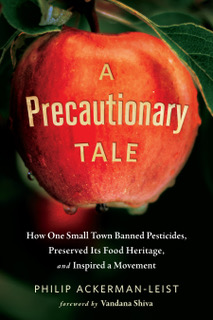A Precautionary Tale: How One Small Town Banned Pesticides, Preserved Its Food Heritage, and Inspired a Movement
It was the first day of two weeks’ voting. The rural alpine municipality of Mals was about to consider a revolutionary possibility – a vote for a “Pesticide Free Mals.” A “yes” vote would end all pesticide use in Mals and therefore initiate a full transition to diversified organic agriculture.The Malsers had awoken to find their township awash with bright yellow sunflowers. The flowers sat in doorways and floated in fountains. Some were painted on manhole covers, others were on sticks in public gardens. Their message was clear. Each sunflower had Ja! (Yes!) boldly printed in its center. The national police ordered them removed, but the flowers mysteriously “regrew” each night until the two weeks’ voting was finished.
This sunflower skirmish was the final exchange in a controversy triggered originally by the appearance of the first industrial apple orchards in Mals. With this new apple monoculture came an influx of highly toxic pesticides. These chemicals, directly and indirectly, posed an existential threat to the traditional rural culture of Mals and to the health and the wellbeing of its citizens. Yet to challenge “Big Apple” was to challenge the myth of progress — the nearly universal belief that the uptake of new technology is essential and inevitable.
A Precautionary Tale For All
Philip Ackerman-Leist published A Precautionary Tale in November 2017. Subtitled How One Small Town Banned Pesticides, Preserved Its Food Heritage, and Inspired a Movement, it could not have been better timed. Earlier in 2017, three separate U.S. groups publicly released large digitized chemical document troves (The Poison Papers, Toxicdocs, and the Monsanto Papers). These searchable databases expose not only the extreme toxicity of common synthetic chemicals, many used in industrial agriculture, but the collusion between industry and regulators necessary to keep these chemicals on the market.
The question therefore arises, “How can individuals and communities protect themselves when regulatory systems do not?” A Precautionary Tale provides a creative and inspiring answer.
